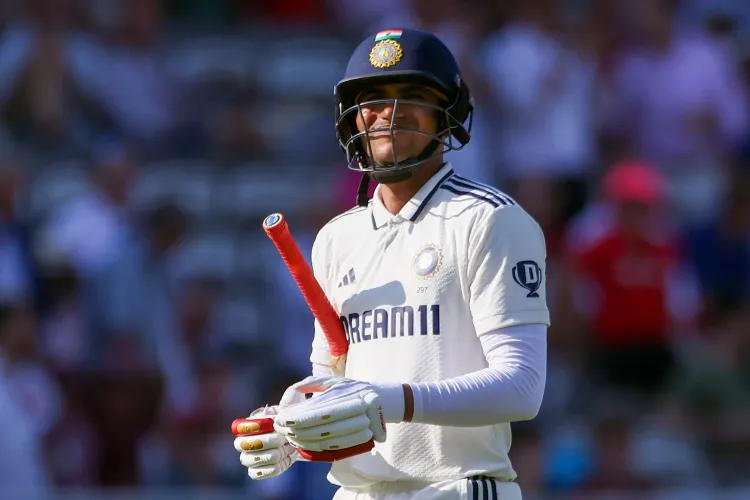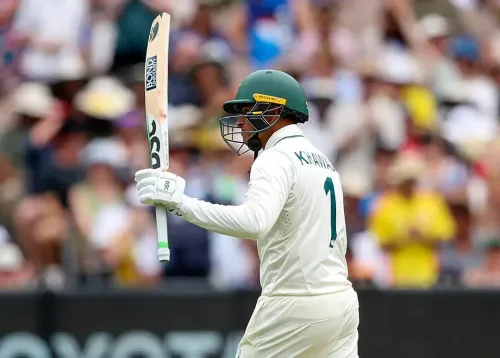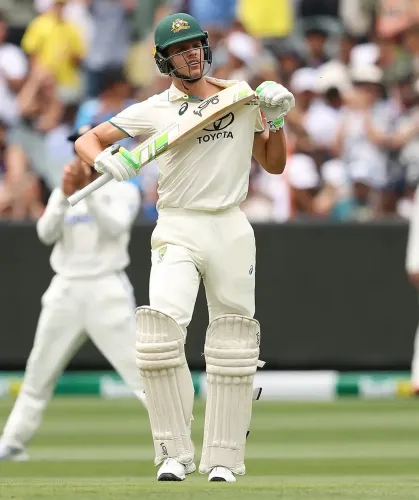Is the 4th Test the Ultimate Test for Gill as Captain?

Synopsis
Key Takeaways
- Shubman Gill faces a pivotal moment in his captaincy.
- Effective communication and clarity are essential for leadership.
- India's performance in the field can impact the series outcome.
- Great captains inspire and unite their teams.
- Partnerships and teamwork are key to success in cricket.
New Delhi, July 19 (NationPress) Former India head coach Greg Chappell has expressed that the forthcoming Old Trafford Test against England represents a significant challenge for Shubman Gill in his tenure as India's captain. He emphasized the need for Gill to maintain composure and clarity in his decisions to keep the series competitive.
So far, Gill has impressively secured three centuries against England in the current Anderson-Tendulkar Trophy series. However, following India's narrow loss in the third Test at Lord's by 22 runs, the team finds itself trailing 1-2 in the five-match series. Gill now bears the crucial responsibility of guiding the squad toward victory in the fourth Test to be held in Manchester, commencing on July 23.
Chappell stated, “The Old Trafford Test is set to be the most significant test for Gill - not merely as a batsman, but as a leader. He is learning on the go, but the timeframe is demanding. He must project composure, clarity, and confidence to a team that critically requires it, and he must act swiftly.”
He added, “This does not imply he should suppress his emotions. In fact, his enthusiasm displayed at Lord's was commendable. However, actions such as confronting Zak Crawley about time-wasting are only effective when supported by diligent preparation behind the scenes. A captain earns the privilege to be vocal when he has already accomplished the quieter tasks of strategizing, unifying, and motivating his team.”
Chappell acknowledged Gill's potential, stating, “As a promising young player, he has exhibited brilliance with the bat and hints of leadership skills, but this moment will determine his path as a Test captain. The environment is challenging, yet it is the one he currently occupies, and the stakes are incredibly high.” This insight was shared in his column for ESPNcricinfo on Saturday.
As Gill continues to develop as a Test captain, Chappell, who has played 87 Tests for Australia and later served as a selector, suggested that the right-handed batsman must also become an effective communicator and start outlining the expectations for the team's performance in the longer format.
Chappell remarked, “Gill must articulate what kind of team he envisions India to be. The captain establishes the tone - not solely through words, but via actions, a clear purpose, and visible standards. This involves demanding discipline on the field, as India cannot afford to regress to poor fielding. The top teams excel in the field, avoiding easy runs and capitalizing on chances.”
He further stated, “Exceptional captains are also exceptional communicators. Gill must evolve into one - swiftly. Whether at practice, in the game, or during breaks in the dressing room, effective and calm communication is vital. His bat cannot always serve as his voice. He must learn to convey messages that align the team, nurture confidence, and foster trust.”
Chappell concluded, “If Gill aspires to be a remarkable Test captain, this is his opportunity to assert his authority. Not just with the bat, but through his leadership. Establish the standards. Demand accountability from others. Assemble your team. Support them. Ensure every player is aware of expectations and hold them accountable.”
“Ultimately, cricket transcends individual heroes. It revolves around partnerships, teamwork, and captains who elevate those around them. If Gill can lead with clarity of thought and determination, he won't just influence this series; he will shape the future of Indian cricket,” he concluded.










